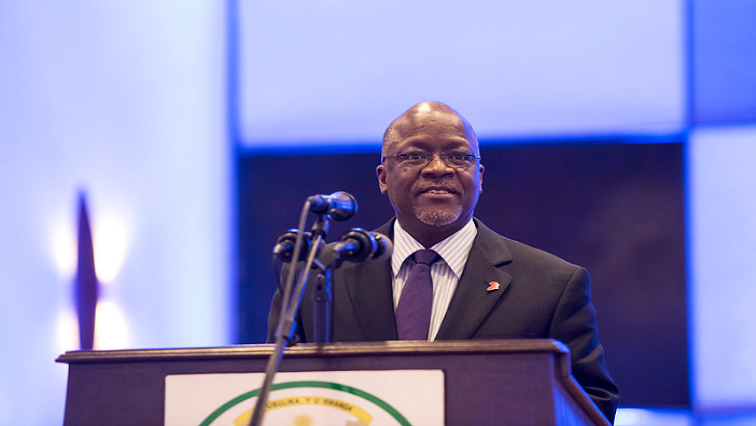The United States Government has expressed its condolences to Tanzanians following the passing of President John Pombe Magufuli.
In a State Department statement, the US says it remains committed to continuing to support Tanzanians as they advocate for respect for human rights while combating the COVID-19 pandemic.
The brief statement, issued by State Department Spokesperson Ned Price, expresses Washington’s hope that Tanzania can move forward on a democratic and prosperous path.
The country’s Vice President and now acting President, Samia Suluhu Hassan, confirmed in a televised address the passing of the 61-year-old Magufuli who had not been seen in public since February 27.
This fueled speculation that he was ailing, possibly from COVID-19. The official word from the government is that he died of a heart ailment.
World Health Organisation Director General, Dr Tedros Ghebreyesus, joined other world leaders, including British Prime Minister Boris Johnson and Venezuela’s Nicolas Maduro, in expressing their condolences to the late President’s family and the people of Tanzania.
Deepest condolences to the people and government of #Tanzania on the passing of President John Magufuli. Our thoughts are with his family as well as the nation at this difficult time.https://t.co/qjILNRsSFm
— Tedros Adhanom Ghebreyesus (@DrTedros) March 17, 2021
Life and times of Magufuli
President Magufuli was admired by followers for his hostility to corruption and waste.
However, he was regarded by foes as an irascible authoritarian intolerant of dissent.
He was nicknamed “The Bulldozer” for his fondness for massive public works and a reputation for pushing through policies despite opposition – a hard-charging leadership style that won support from many Tanzanians. But he also attracted criticism at home and abroad for what opponents saw as his eccentric handling of the coronavirus pandemic.
Mangufuli decried lockdowns, was sceptical of COVID-19 drugs and suggested vaccines may be part of a foreign plot to steal Africa’s wealth.
“Vaccines are not good. If they were, then the white man would have brought vaccines for HIV/AIDS,” he said.
“Tanzanians should be careful with these imported things. You should not think that they love you a lot. This nation is rich, Africa is rich, everyone wants some of it.”
The government stopped reporting statistics for new cases and deaths in May last year when it had registered 509 cases and 21 deaths. Magufuli had questioned coronavirus testing kits – which he said had returned positive results on a goat and pawpaw fruit. He declared the pandemic over and reopened the economy.
But the death in February of a senior politician from the semi-autonomous archipelago of Zanzibar raised concerns about a hidden pandemic running amok in the East African nation.
Tanzania’s Magufuli urges caution over COVID-19 vaccine:
Magufuli’s approach caused alarm at the World Health Organisation, prompting its head to implore Tanzania to improve public health measures, prepare to distribute vaccines and start reporting coronavirus cases and sharing data.
Quick rise to influence
Born in the village of Chato in the Geita region of northwestern Tanzania, Magufuli was first elected to parliament in 1995 from his home constituency.
A former chemistry teacher, he quickly climbed the political ladder and served in various cabinet roles, including as minister of works, before he won the presidency in 2015.
During his first presidential campaign, he captured headlines by doing push-ups at a rally to demonstrate his physical fitness for office. His cost-cutting including cancelling independence day festivities and restricting foreign travel by officials.
He was re-elected for a second term in 2020, winning 84% of the vote in a ballot the opposition said was marred by irregularities and whose results it rejected. Upon re-election, he promised to build on his agenda of fighting corruption and reducing wasteful public spending, moves which won him praise in his first term.
Magufuli begins 2nd term as Tanzania’s President amid vote-rigging concerns:
Magufuli, in no-nonsense style, would make unannounced inspection visits to government departments, and once sacked senior managers at Tanzania’s main public hospital, saying they were not delivering. He also purged thousands of “ghost workers” from the government, and reduced his own salary as part of spending cuts.
He was tough on businesses when he thought they were under-paying taxes. In 2017, his government accused gold producer Acacia Mining of evading taxes and under-declaring exports, hitting it with a $190 billion tax bill.
Barrick Gold Corp, which owned the majority of Acacia and eventually bought it out, agreed to pay Tanzania $300 million to settle tax and other disputes.
Critics said Magufuli had presided over deterioration of the political scene, after his administration arrested opposition leaders, suspended some newspapers and restricted political rallies. The government denies suppressing dissent.
Among those critics is opposition leader Tundu Lissu, shot 16 times by unknown gunmen in the administrative capital Dodoma in September 2017. He accused the state of trying to kill him, which the government denied.
On the economic front, he embarked on ambitious infrastructure projects in the hope of supercharging East Africa’s third largest economy. These included a railway, a hydropower project and the revival of state carrier Air Tanzania, spending billions of dollars in the process.
– Additional information by Reuters


